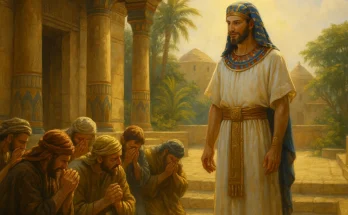When we think of Adam, the first man created by God, we often picture the beginning of everything—humanity, creation, and even sin. As the father of the human race, Adam’s story in the book of Genesis is full of lessons about life, choices, and consequences. But have we ever really considered what it means for Adam to have been the very first human? What can we learn from his unique relationship with God and the world around him? Let’s dive into Adam’s life and explore how his choices still impact us today.
Strengths and Accomplishments
Adam’s strengths and accomplishments are foundational to understanding humanity’s beginnings. Created in God’s image, Adam holds a unique place in creation. As Genesis 1:26-27 tells us, Adam was made to reflect God’s likeness, giving him a spiritual, moral, and intellectual capacity that set him apart from all other creatures. This divine image also emphasizes the dignity and responsibility bestowed upon Adam as the first man.
One of Adam’s primary roles was as the caretaker of the Garden of Eden. Genesis 2:15 describes how God placed Adam in Eden to work and care for it, giving him stewardship over creation. In addition, Adam had the privilege of naming every animal (Genesis 2:19-20), a task that symbolized his authority and partnership with God in overseeing the earth.
As the father of humanity, Adam’s significance goes beyond his own life. Genesis 3:20 identifies him as the father of all living, not only physically but also spiritually. His actions had far-reaching consequences, impacting every generation to come. Adam’s role as the first man makes him a central figure in the human story.
Before the fall, Adam enjoyed a close and personal relationship with God, living in perfect fellowship with his Creator. This intimacy represents the original purpose of humanity—to live in harmonious communion with God. Adam’s relationship with God serves as a reminder of the ideal connection we were created to have with our Maker.
Adam’s unique creation, his responsibility in Eden, his role as the father of humanity, and his close relationship with God all highlight his strengths and accomplishments as a pivotal figure in both creation and human history.
Weaknesses and Mistakes of Adam
Adam’s story is not only one of accomplishment but also of significant weaknesses and mistakes that shaped the course of human history. His most notable failure was his disobedience in the Garden of Eden. Despite God’s clear command not to eat from the Tree of the Knowledge of Good and Evil (Genesis 2:16-17), Adam chose to disobey. Alongside Eve, he ate the forbidden fruit (Genesis 3:6), bringing sin into the world. This act of rebellion against God marked the first sin and fundamentally altered humanity’s relationship with God.
Another key mistake was Adam’s failure to lead. When the serpent deceived Eve, Adam stood by passively. He didn’t intervene or protect his wife from the serpent’s lies (Genesis 3:1-6). His silence and inaction during this critical moment contributed to the fall. Adam, as the head of the human race, had the responsibility to guard and guide, but his failure to do so allowed sin to enter their lives.
The consequences of Adam’s disobedience were devastating. God cursed the ground, making work laborious and frustrating (Genesis 3:17-19). Adam and Eve were also expelled from the Garden, cutting off their direct fellowship with God. Most significantly, Adam’s sin brought death into the world, not just for him but for all of humanity (Romans 5:12). The fallen nature passed down through Adam affects every person, creating a legacy of sin and separation from God.
Adam’s weaknesses and mistakes serve as a sobering reminder of the consequences of disobedience and the far-reaching effects of sin. His failure to lead and his choice to rebel against God set the stage for humanity’s need for redemption.
Lessons from Their Life
Adam’s life offers crucial lessons about the importance of obedience to God. His disobedience in the Garden of Eden reminds us that trusting and following God’s commands is essential to maintaining a close relationship with Him. Adam’s failure to obey not only brought sin into his own life but affected the entire human race, showing us how our choices can have far-reaching consequences.
The ripple effect of Adam’s sin is felt throughout history, as suffering, death, and separation from God entered the world through his disobedience (Romans 5:12-14). His story illustrates the devastating impact of sin and how it touches every part of creation.
Yet, Adam’s life also reveals God’s incredible grace. Despite his failure, God’s redemptive plan began with a promise in Genesis 3:15, foretelling the coming of Christ. Through Jesus, the “second Adam,” redemption and restoration became possible. Adam’s story reminds us that even in our failures, God provides a way for us to return to Him through His grace.
In Adam’s life, we learn the importance of obedience, the weight of sin, and the hope found in God’s redemptive plan for humanity.
Vital Statistics for Adam
Adam, whose name in Hebrew means “man” or “human,” is a central figure in the Bible, particularly in the book of Genesis. As the first human created by God, Adam’s life is recounted in significant passages such as Genesis 1-3, where his creation, role, and fall are described. In the New Testament, Adam’s impact is referenced in Romans 5:12-21 and 1 Corinthians 15:45-49, where his role in introducing sin and death is contrasted with Christ, the “second Adam,” who brings life.
Adam’s occupation was to be the gardener and caretaker of the Garden of Eden (Genesis 2:15). Alongside his wife, Eve, he began the human family, becoming the father of Cain, Abel, Seth, and other children (Genesis 5:4). His legacy as the father of humanity carries profound theological importance.
According to Genesis 5:5, Adam lived for 930 years before his death. Though his life was marked by the fall and its consequences, Adam’s story plays a crucial role in the larger biblical narrative of sin, redemption, and God’s plan for humanity.
- Timeline: Creation of the world, as depicted in Genesis.
- Family and Key Relationships: Eve (wife), Cain, Abel, and Seth (sons).
- Major Events: Creation, naming of the animals, the Fall, expulsion from Eden.
Adam’s life, as the father of the human race, had a profound impact on humanity. His disobedience introduced sin and death into the world, affecting all of creation. However, his story also points to God’s redemptive plan through Jesus Christ, the “second Adam” (1 Corinthians 15:45), who brings life and restores what was lost. Adam’s life reminds us of the consequences of sin but also of the hope found in God’s grace. As we reflect on Adam’s story, may it encourage us to trust and obey God, seeking restoration in our own relationship with Him.
Key Verses for Adam
“The man said, ‘The woman you put here with me – she gave me some fruit from the tree, and I ate it’” (Genesis 3:12).
“For as in Adam all die, so in Christ, all will be made alive” (1 Corinthians 15:22)
Adam’s story is told in Genesis 1:26-5:5. He is also mentioned in 1 Chronicles 1:1; Luke 3:38; Romans 5:14; 1 Corinthians 15:22, 45; 1 Timothy 2:13, 14.
Frequently Asked Questions (FAQ) About Adam
- Who is Adam in the Bible?
Adam is the first man created by God, as described in the book of Genesis. He is the father of all humanity and plays a key role in the biblical story of creation and the fall of man. - Why is Adam called the father of the human race?
Adam is called the father of the human race because he was the first human created by God, and through him, all humans are descended. His actions in the Garden of Eden also had lasting effects on all humanity. - What was Adam’s role in the Garden of Eden?
Adam was given the responsibility to tend to and care for the Garden of Eden. He also named the animals and had a close relationship with God before the fall. - What mistake did Adam make, and what were the consequences?
Adam disobeyed God by eating from the Tree of the Knowledge of Good and Evil. As a result, sin and death entered the world, and humanity was separated from God. - How does Adam’s story relate to Jesus?
In the New Testament, Jesus is referred to as the “second Adam.” While Adam’s disobedience brought sin and death, Jesus’ obedience and sacrifice bring redemption and eternal life (1 Corinthians 15:45).



